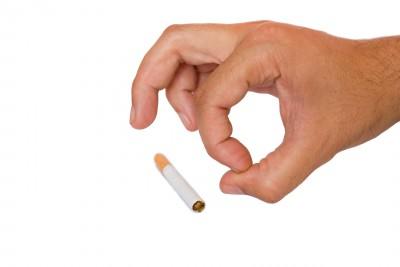References included

If you smoke you are likely have low levels of important nutrients such as polyunsaturated fats(which includes omega 3), protein, fibre, iron, beta-carotene[ 2, 3], vitamin C[ 2-4], vitamin E[ 2] and the B Vitamins, [ 5-7, 4, 8-10]. The reasons for this are twofold; smokers are more likely to have a poor diet[ 3] and cigarette smoking results in a deficiency of these nutrients[ 2, 3]. The nutrient deficiencies are exacerbated as smoking can increase the amount of nutrients needed by the body such as vitamin E and vitamin C[ 11]. When nutrients are low you are at a greater risk of illness; including cardiovascular problems, cancer, type 2 diabetes and mental health problems[ 2, 5, 12, 6, 7, 4, 9]. In addition the smoking itself will make you more likely to get these illnesses[ 2, 12, 4].
One of the major obstacles to stopping smoking is that the smoker feels tense when stopping smoking. This is due partly to the addiction to nicotine. It may also be explained by low levels of omega 3 Fatty Acids, B vitamins, Vitamin C, iron and protein which are important to maintain good mental health[ 13-20] .

Studies show people who smoke generally eat less fruits and vegetables than non-smokers; resulting in low levels of vitamin C, B Vitamins and iron[ 3, 4].
Research shows that people with anxiety disorders have greater difficulty in stopping smoking than others[ 21]. If you have been struggling to stop smoking attention to your diet and nutrient intake could be a key to your success. If I do recommend nutrients I suggest the Entire Katoa Food State supplements for the best absorption. As part of your changes in diet to eat more nutritious food be sure to include almonds as they have been shown to help decrease some of the damage caused by smoking[ 12]; of course you will still need to stop smoking.
Herbal medicine can be hugely helpful in relieving anxiety associated with anxiety and withdrawal from nicotine. In particular herbs such as Valerian, Motherwort, Vervain and Skullcap are used. These not only relive anxiety but also strengthen the nervous system. A naturopath can mix a number of herbs so that the herbal medicine is tailored to your specific needs which best supports your health.
Very often smoking is used as a reason to take a break and relax in the day. So when you stop smoking make sure you still take those breaks; sit and chill, get outdoors or chat with a friend, just not accompanied by a cigarette.
Naturopaths will help you learn how best to support your body so that whatever the impact of cigarettes are on your health you can begin to look forward to enjoying a healthy life. Start by making the decision today to quit smoking.

We provide FREE Quitcards for anyone wishing to use Nicotine Replacement Therapy as one of the strategies to stop smoking. Contact us for details.
References click on title for a link to the abstract
2. Dallongeville J, Marecaux N, Fruchart J-C, Amouyel P: Cigarette Smoking Is Associated with Unhealthy Patterns of Nutrient Intake: a Meta-analysis. J Nutr 1998, 128(9):1450-1457.
3. Margetts BM, Jackson AA: Interactions between people's diet and their smoking habits: the dietary and nutritional survey of British adults. BMJ 1993, 307(6916):1381-1384.
4. Palaniappan U, Starkey LJ, O'Loughlin J, Gray-Donald K: Fruit and Vegetable Consumption Is Lower and Saturated Fat Intake Is Higher among Canadians Reporting Smoking. J Nutr 2001, 131(7):1952-1958.
5. Larsson SC, Giovannucci E, Wolk A: A Prospective Study of Dietary Folate Intake and Risk of Colorectal Cancer: Modification by Caffeine Intake and Cigarette Smoking. Cancer Epidemiology Biomarkers & Prevention 2005, 14(3):740-743.
6. O'Callaghan P, Meleady R, Fitzgerald T, Graham I: Smoking and plasma homocysteine. European Heart Journal 2002, 23(20):1580-1586.
7. Ortega RM, Requejo AM, Lopez-Sobaler AM, Navia B, Mena MC, Basabe B, Andres P: Smoking and Passive Smoking as Conditioners of Folate Status in Young Women. J Am Coll Nutr 2004, 23(4):365-371.
8. Piyathilake CJ, Macaluso M, Hine RJ, Richards EW, Krumdieck CL: Local and systemic effects of cigarette smoking on folate and vitamin B- 12. Am J Clin Nutr 1994, 60(4):559-566.
9. Stolzenberg-Solomon RZ, Albanes D, Nieto FJ, Hartman TJ, Tangrea JA, Rautalahti M, Sehlub J, Virtamo J, Taylor PR: Pancreatic Cancer Risk and Nutrition-Related Methyl-Group Availability Indicators in Male Smokers. J Natl Cancer Inst 1999, 91(6):535-541.
10. Ulvik A, Ebbing M, Hustad S, Midttun O, Nygard O, Vollset SE, Bonaa KH, Nordrehaug JE, Nilsen DW, Schirmer H et al: Long- and Short-term Effects of Tobacco Smoking on Circulating Concentrations of B Vitamins. Clin Chem 2010, 56(5):755-763.
11. Bruno RS, Traber MG: Cigarette Smoke Alters Human Vitamin E Requirements. J Nutr 2005, 135(4):671-674.
12. Li N, Jia X, Chen CYO, Blumberg JB, Song Y, Zhang W, Zhang X, Ma G, Chen J: Almond Consumption Reduces Oxidative DNA Damage and Lipid Peroxidation in Male Smokers. J Nutr 2007, 137(12):2717-2722.
13. Brian MR: Omega-3 polyunsaturated fatty acids and anxiety disorders. Prostaglandins, leukotrienes, and essential fatty acids 2009, 81(5):309-312.
14. Brody S, Preut R: Cannabis, tobacco, and caffeine use modify the blood pressure reactivity protection of ascorbic acid. Pharmacology Biochemistry and Behavior 2002, 72(4):811-816.
15. Coppen A, Bolander-Gouaille C: Treatment of depression: time to consider folic acid and vitamin B12. Journal of Psychopharmacology 2005, 19(1):59-65.
16. Gilbody S, Lightfoot T, Sheldon T: Is low folate a risk factor for depression? A meta-analysis and exploration of heterogeneity. Journal of Epidemiology and Community Health 2007, 61::631-637.
17. Joshi K, Lad S, Kale M, Patwardhan B, Mahadik SP, Patni B, Chaudhary A, Bhave S, Pandit A: Supplementation with flax oil and vitamin C improves the outcome of Attention Deficit Hyperactivity Disorder (ADHD). Prostaglandins, Leukotrienes and Essential Fatty Acids 2006, 74(1):17-21.
18. Kim J-M, Stewart R, Kim S-W, Yang S-J, Shin I-S, Yoon J-S: Predictive value of folate, vitamin B12 and homocysteine levels in late-life depression. The British Journal of Psychiatry 2008, 192(4):268-274.
19. Pnina G, Haggai H, Assaf M, Sofi M, Gadi P, Abraham W: Red cell membrane omega-3 fatty acids are decreased in nondepressed patients with social anxiety disorder. European neuropsychopharmacology : the journal of the European College of Neuropsychopharmacology 2006, 16(2):107-113.
20. VOLKER D, NG J:Depression: Does nutrition have an adjunctive treatment role? Nutrition & Dietetics 2006, 63(4):213-226.
21. Lawrence D, Considine J, Mitrou F, Zubrick SR: Anxiety disorders and cigarette smoking: Results from the Australian Survey of Mental Health and Wellbeing.Australian and New Zealand Journal of Psychiatry 2010, 44(6):520-527.?
FIND OUT MORE ABOUT...